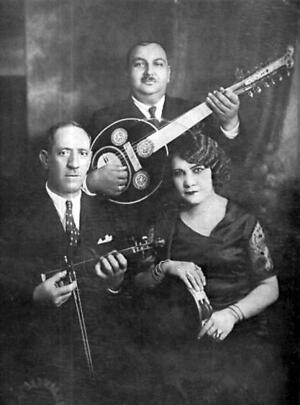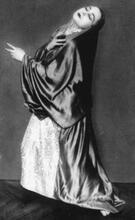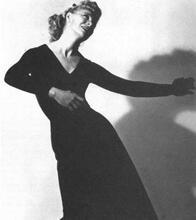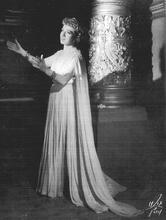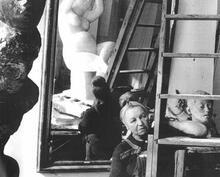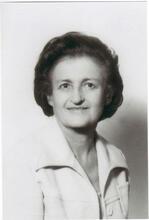Rosa Eskenazi
Rosa Eskenazi in Athens in 1932 with Demitris Semsis and Agapios Tomboulis. Image courtesy of Wikimedia Commons
Roza Eskenazi was a renowned, multilingual Greek singer who had a long and influential career. At seven, Eskenazi moved to Greece with her family and became enamored with the local theater scene over her parents’ objections. She began dancing in taverns and theaters and quickly began singing as well. In the late 1920s, a recording mogul noticed Eskenazi, who launched her career, started touring extensively, and recorded more than five hundred songs in the next ten years. She spent the German occupation running a restaurant in Athens, often risking her life to save others from the Nazis. After a brief resurgence as a recording artist in the 1950s, she retired, only to return to the spotlight in the 1970s, performing on television until her death.
Roza Eskenazi, arguably the greatest and most renowned Greek diva, was born in Constantinople and named Sarah Skinazi. Roza’s exact date of birth is not known. In her autobiography Auta Pou Thimame (What I Remember), she states that she was born in 1910. Published in 1982, the autobiography is based on interviews Eskenazi gave in 1972. Apart from being forgetful by then, she appears to have deliberately concealed her age, as she probably had done since the 1920s. The Greek musicologist Panayiotis Kounadis is among those who believe that Eskenazi was born between 1883 and 1887, whilst others maintain that she was born between 1890 and 1900.
Early Life and Family
Roza Eskenazi was a Descendants of the Jews who lived in Spain and Portugal before the explusion of 1492; primarily Jews of N. Africa, Italy, the Middle East and the Balkans.Sephardic Jew. Her father, Avraham Skinazi, owned a storage facility. No documented facts can be found regarding her mother, Flora. She had one sister (name unknown) and two brothers, Sami and Nissim. By 1972 she had outlived all her siblings.
When she was about seven years old, Eskenazi moved with her family to Thessaloniki, where they rented a small room in a lodging house. She never attended school but learned how to read and write from a kindly female fellow-tenant whilst her parents were working during the day at a cotton plantation. Eskenazi had spoken only Turkish up to this point, but she quickly learned Greek. Her father became a professional money lender/changer at some point after moving to Greece.
Eskenazi’s early years are very poorly documented. In her autobiography, she states that the family moved to Komotini, but she could not remember how long she stayed there. It is interesting that her father stayed in Thessaloniki during this period, but it is unclear whether this was for economic or domestic reasons.
Eskenazi and her mother returned to Thessaloniki, where they lived in a house shared with artists who danced and worked at a beautiful theater called Grand Hotel. (The artists lived in apartments above Eskenazis’.) Eskenazi took the women’s clothes to and from the theater and became enchanted by the theatrical world. She wanted desperately to be an artist and would practice at home in front of a mirror.
One day Roza took to the stage of the Grand Hotel and danced. She received a beating when her mother found out; indeed, her family were determined that she would not become an artist. Eskenazi was so passionate and sure of what she wanted that, despite being frightened, she could not be dissuaded. How this conflict with her family was resolved is not recorded.
Performance Career
Around 1910 (possibly in order to get away from her family), Eskenazi began to work in Piraeus with an Armenian troupe run by Saramous and Zabel. She performed at theaters and taverns, initially mainly dancing, but shortly thereafter starting to sing in Greek, Turkishm and Armenian.
At some point early in her career her first name of Sarah was dropped and Roza (or Rozitsa) was adopted. This may have been because her family did not approve of her career choice, but the date and reason for the change are not documented.
In her autobiography, Eskenazi states that she did not work in “café amans” (a café where singers would improvise songs) or “café satans” (cabarets). She infers that these places were disreputable. However, it is likely that Eskenazi did indeed work in cabarets; although there are few documented facts, a still of Eskenazi from 1915 appears to be of a typical cabaret singer. (This may also be part of the explanation of what Eskenazi was doing during the years she tried to keep hidden by changing her age so drastically.)
In the late 1920s Eskenazi was singing and dancing at an open-air tavern called Tsitsifies, near Piraeus. One night, Panayiotas Toundas, a legendary Greek rembetika composer/lyricist/arranger (and at the time director of Odeon records), visited Tsitsifies and noted her exceptional talent and the wondrous reception Eskenazi got from the audience. In the ensuing discussion, she thought that Toundas was trying to pick her up and was rude to him. Subsequently Toundas arranged a recording session and Eskenazi made her first records in late September 1929. She scored an immediate success with the public and began recording prolifically.
Recording Career
Roza began working at Taiyetos, a tavern on Dorou Street, with Dimitris Semsis (known as Salonikios), a virtuoso violinist, composer, lyricist, arranger and recording director; Agapios Toumboulis, a master of the oud; and Lambros Leonaridhis, an expert kemence/Turkish lyra player. Eskenazi and her associates were an outstanding success and played at the tavern for over a decade, in addition to touring. Eskenazi became the highest paid artiste of the time. She sang smyrneika, rembetika, amanedes, and demotic (folk) songs and recorded over five hundred songs in the 1930s—a record for a Greek singer in that decade. Eskenazi collaborated with all the leading figures in rembetika music before and after World War II. Multilingual, she sang in Greek, Turkish, Arabic, Yiddish, Italian, Ladino (a.k.a. Judeo-Spanish or Djudezmo), and Armenian.
Roza Eskenazi Kanarini Mou Glyko (Recordings: 1930-1947)
Before the outbreak of World War II, Eskenazi toured the Balkans and Near East and in 1937 recorded for HMV in Constantinople. Despite lacking any formal musical training, she also composed and wrote lyrics, including the words and music to one of her most famous songs “To Kanarini” (The Canary) which she recorded on July 21, 1934. (The music was derived from a Turkish tune called “Bulbul.”) Eskenazi’s “Kanarini” has date recorded countless times, but she rarely receives credit for it, since the song is often listed as an old traditional song by an unknown composer and lyricist.
Other Work and Travels
In the 1930s, Eskenazi married Gianko Sarntinidi, a successful actor supposedly older than herself. Unfortunately, he was a very heavy drinker and died while Eskenazi was pregnant with her son. Eskenazi stated in 1972 that she had three grandchildren from their one son. Nothing is known of surviving descendants.
Roza ran a restaurant in Satovriandhou Street in Athens during the German occupation and was renowned for the generous help she gave people in those difficult years. She risked her own life in the process of helping others. One must keep in mind that Eskenazi— a successful Jewish artist and businesswoman—represented everything the fascist Germans detested.
Eskenazi met her longtime companion, Christos Philipakopoulos, in 1947, and they remained together until her death.
An active member of the Musicians Guild, whose offices were in Agion Konstantino, Eskenazi recommended the Guild to new and upcoming artists. In addition, she was instrumental in helping to bring legendary artists such as Marika Ninou and Stella Haskil to the attention of Athenians.
Eskenazi worked, toured and recorded again after the war. She visited the United States twice in the 1950s (one visit lasted nine months) and performed in Chicago, New York, and Detroit. Eskenazi also returned to Constantinople in the 1950s. On these trips, she recorded songs in the United States and Turkey and had great success both in touring and in massive record sales. The 45-rpm records she recorded for RCA in the early to mid-1960s included both reworkings of songs she had recorded in the 1930s and new songs.
Rosa Eskenazi (Ρόζα Εσκενάζυ)- Tou Peiraia Alani (Του Πειραιά το αλάνι) / Lyrics and Pronounciation
In the late 1950s Eskenazi returned to Athens and purchased a large house in Kipoupoli, Peristeri, where she lived for the remaining years of her life.
Legacy
With the revival of rembetika music in the early to mid-1970s, Eskenazi’s legacy was brought to the attention of a new generation and once again she was in demand. It is amazing that despite being seventy-five to eighty-five years old she performed live, singing and dancing in concerts and appearing on television.
In 1975, on the occasion of one TV appearance, Roza met with Haris Alexiou, a modern Greek diva who had some of Eskenazi’s songs in her repertoire. Eskenazi sang “Hariklaki” and “Dimitroulla,” although her voice was—understandably—much coarser than in her heyday. Eskenazi stopped singing publicly around the late 1970s and died at home on December 2, 1980. She was buried at Stomio on the Gulf of Corinth. Sadly, for someone who gave so much of her talent to the world and was loved by people of all nationalities, Eskenazi’s grave is not marked.
Eskenazi possessed a sweet voice with incredible range, power, and control. Her poignant voice has a particularly haunting quality in the more blues-like songs. The vulnerability in her voice is communicated directly to the listener via her interpretations of the lyrics, a quality she shared with Edith Piaf and Billie Holiday.
With CDs continuing to be issued both by Greek companies and companies in the UK and USA, Eskenazi’s unique and exceptional musical legacy will be appreciated by new generations and in this way she will live on.

